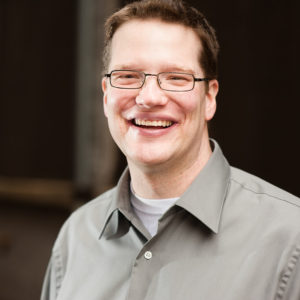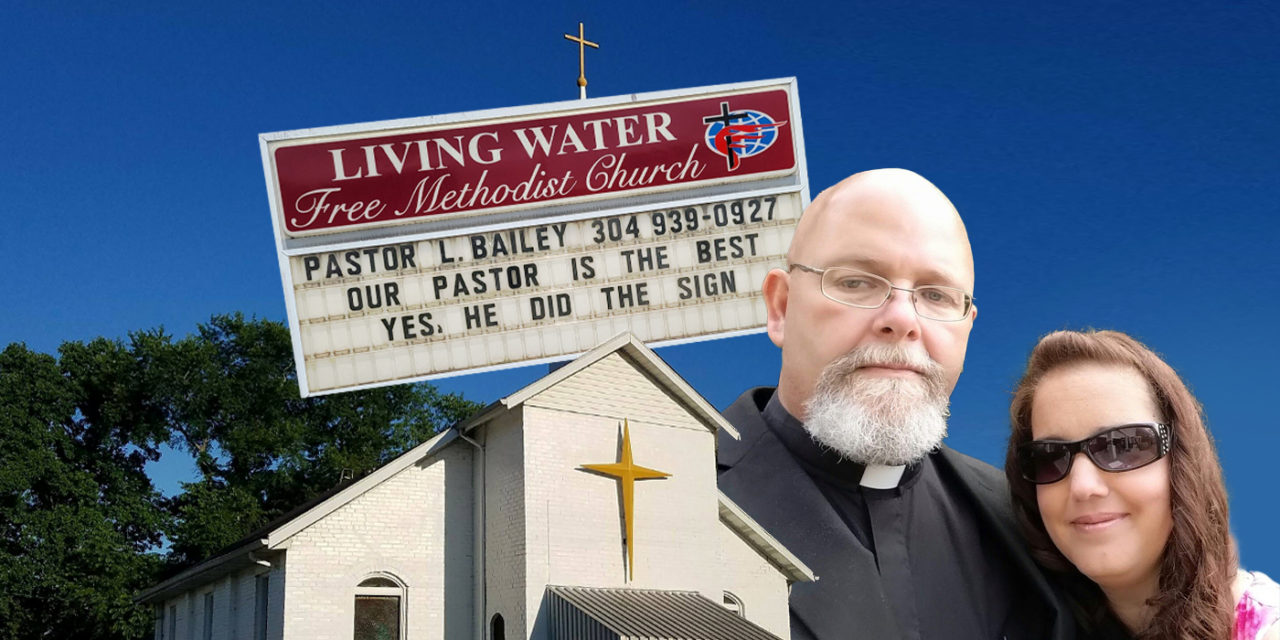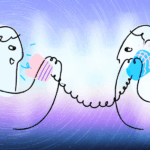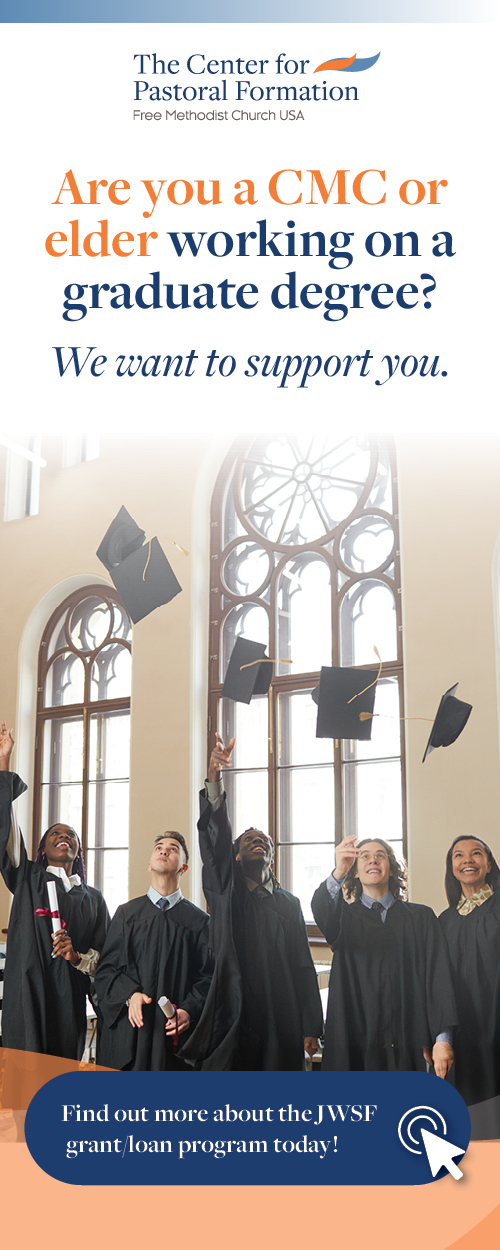
Jeff Finley
Light + Life Executive Editor
Jeff Finley is this magazine’s executive editor. He joined the Light+Life team in 2011 after a dozen years of reporting and editing for Sun-Times Media. He is a member of John Wesley Free Methodist Church where his wife, Jen, serves as the lead pastor.
by Jeff Finley
Larry Bailey never expected to make international news by inviting his Marshall University students to Thanksgiving dinner at his home in Huntington, West Virginia.
But one of his students tweeted about Bailey’s invitation three years ago, and Yahoo! News published a story titled “This college professor invited all his students to Thanksgiving dinner at his home: ‘You would be treated as family.’”
“I actually got phone calls from reporters in not only the U.S. but Australia and South Africa,” Bailey said. “It was crazy.”
Bailey isn’t just a professor. As some of the news coverage noted, he’s also the senior pastor of Living Water Free Methodist Church. He has served both the congregation and the public research university (which inspired the movie “We Are Marshall”) for 13 years.
The invitation reflected a Bailey family tradition that didn’t attract media attention for many years. Bailey traces it to his time as a married undergraduate student at the Christian college in Florida that is now known as Warner University.
“Our house was literally straight across the street from the girls’ dorms. We were married, raising three kids, so we were already kind of in a parental role,” he recalled. “There was an understanding with all the kids on campus if they didn’t have a place to go, they were always welcome at our house.”
That understanding included hosting students who weren’t able to return home for holidays.
“When I started teaching at Marshall in 2008, I remembered just how blessed our lives were by those kids at Warner,” Bailey said. “The very first semester of teaching at Marshall, I just offered the invitations: ‘If you don’t have anywhere to go, you’re welcome to have dinner with me and my family. Get some couch time, some TV time. My family is loud and boisterous anyway.’ We’ve made that invitation specifically for Thanksgiving and Easter every year since 2008.”
The Thanksgiving invitation continues in 2021 with pandemic precautions.
“Now with COVID, I tell the kids, ‘Listen you’re invited. The only thing I ask of you is use some common sense before you come to my house,’” Bailey said. “If you’re exposed, we have to deal with that accordingly, but if you’re using common-sense safety measures, come on.”
Bailey said most students don’t take him up on the offer because they’re going home to their families or going home with friends, so only one or two students typically are at the table for Thanksgiving. However, students often join the family for meals at other times.
Each fall semester at Marshall, Bailey teaches a literature of the Old Testament course and another course on the Hebrew prophets. During the spring semester, Bailey teaches a course on the literature of the New Testament and another on the teachings of Jesus.
How is Bailey able to teach the God-given revelation of the Bible at a state university?
“I’m a firm believer that the Word of God doesn’t always need me to speak for it. My goal in my classes is to teach my students how to read Scripture in its appropriate context and let them draw their own faith conclusions. I believe the Word of God can speak for itself when people know how to read it,” Bailey said. “Every semester I get the emails from students that have walked away from the church but are now going back. I get one or two emails from students that have never been connected to church, but they hear horror stories of Christianity, so at the end of my classes they’re like, ‘Well, this is an obviously different kind of faith than I’ve heard about.’ They start exploring, and some of them end up in church.”
Bailey said many students have been exposed to hateful people who claim to be Christians, but they’ve lacked exposure to the love-driven justice found in the Bible.
“I’ve had more students come to Christ because of my Old Testament courses — my ‘Hebrew prophets’ and my ‘literature of the Old Testament’ course — because they’ve never been exposed to the social justice aspect that is so important to this young generation,” Bailey said. “Through the vast majority of the prophets, there’s this huge social justice aspect of taking care of the widow, the orphan, the stranger. … When they begin to see this, they say, ‘Ah, this is a faith I can get behind.’”
Since participating in a General Conference 2015 mission trip to Haiti, Bailey has engaged in cross-culturation collaboration through serving as an adjunct professor for Haiti Providence University and developing close friendships with the university’s faculty and staff. Until the COVID-19 pandemic, he made two-week trips to Haiti to teach a weeklong biblical studies course followed by a weeklong counseling course. He now teaches an online course for Haiti Providence that lasts a full semester.
Small Church, Big Impact
When Bailey arrived at Living Water FMC, he encountered a preservation mindset that mirrored many other small congregations.
“This is not a besmirchment upon the small church, but the small church often just tries to survive. They try to keep the doors open. They’re focused on paying the power bill, the gas bill, the water bill and struggling to do so,” said Bailey who reminded the congregation, “Unless we’re ministering to the community, we’re not a church.”
He and his wife, Pam (whom he calls Precious), led by example. They took the food from their cabinets and turned an empty church room into a food pantry. People in need had occasionally been coming to the Bailey home for food, and the couple began directing them to the church.
“After a few weeks of doing that, the church had no idea. On a Sunday morning, I announced to them that their food pantry was doing well. They were like, ‘What food pantry?’” said Bailey with a friendly laugh that punctuates much of his conversation. “The church membership began bringing food and putting it on the shelves in the pantry. That just continued to grow. Well, the great thing about seeing the hand of God move is that the people of the community wanted to get involved somehow.”
Bailey placed a box in front of the church building and told local residents, “If you really want to be able to serve in the name of Jesus, just drop by the church and put some food in the food box.”
The food box became a success, and the focus shifted from the pantry to the easily accessible box. News spread outside the Huntington area. A church in Logan County — part of West Virginia’s coal-mining country where Bailey grew up — began sending money to buy food for the box, and donations began coming from other states.
“I have family and friends literally from Virginia Beach to the Pacific Coast in Oregon that will ship us, through Sam’s and Costco, shipments of food,” Bailey said. “Just from what I count, I see probably between 20 and 30 people visiting our food box per day. That’s not counting the ones that come through the wee hours of the morning. We’re putting out anywhere between 30 and 80 pounds a day in the box besides what the community puts in.”
The food box is one way that Living Water FMC makes a big impact despite its small size.
“On a good Sunday, we have 20 people in attendance,” said Bailey, who added that despite the congregation’s small attendance numbers, “since 2008 we have never not been able to put food in the food box. God provides, and God provides through the generosity of others.”
Living Water doesn’t just help people in the church’s neighborhood. The congregation pursues collaboration with other local groups, such as Harmony House that helps people facing homelessness and hunger.
“We do a monthly food service downtown for the homeless and the hungry,” Bailey said. “That is geographically distant enough from our church that one would not feasibly think that you would pick up any members, and that’s by design for us.
Meal recipients shouldn’t expect simple sandwiches or soup.
“We don’t serve typical homeless meals. We pull out all the stops. If you think about your best family dinners, that’s what we take,” said Bailey who added that Living Water members envision meeting “Jesus in the face of every person we serve, and we don’t want Jesus to be disappointed.”
From Addict to Pastor
Bailey knows what it’s like to go through hard times, and he also knows what it’s like to experience God’s life-giving holiness.
“My testimony’s one of the more dramatic. I am an ex-addict. I lived that life for a lot of years,” he said. “I started when I was 10 — no lie — smoking weed, drinking beer. By the time I was 14, when I could get ahold of IV drugs, I was using IV drugs.”
His health spiraled as his drug use shifted simultaneously to opioids and amphetamines. While in his mid-20s, Bailey recalled, “I turned to my dad for help. I don’t even remember making the drive to his house. My dad’s the last person that I normally would have turned to for help, but I ended up at his house — withdrawal, shaking, trembling, about ready to go into seizures.”
His father began calling rehabilitation centers, but they demanded money upfront. Because Bailey lacked insurance, his father couldn’t find a center that would accept him. Finally, one center’s receptionist said that if Bailey was in the condition his father described, he could call the police who would be required to get him help.
“My dad had me arrested. I remember about 15 minutes of being in jail. I remember about 15 minutes of being in a hospital. About two weeks later, I woke up, and I was in the detox unit of a rehab. I have no memory of almost two weeks,” he said. “At some point in that fog, I gave my heart to Jesus. I don’t remember doing it. I just knew that I’d done it.”
He soon found a church home.
“I got out of lockup and started attending a Free Methodist church here in Huntington,” he said. “I became a Free Methodist by chance. It was the perfect little church for me. They welcomed me. They didn’t treat me like pariah. They were good to me. They befriended me.”
Within six months, Bailey felt a call to ministry but didn’t tell anyone. Then his pastor surprised Bailey by asking him to preach when the pastor needed to be out of town. Bailey realized God’s call on his life.
“I started preparing for ministry there. It’s also at the same time I met my wife. When I announced my call, she and I began a relationship, so she’s been with me every step of the way,” Bailey said.
The couple eventually connected with another Wesleyan Holiness denomination, but they reconnected with the Free Methodist Church while Bailey studied at Warner in Florida and then continued his education at Asbury Theological Seminary’s Orlando campus. A college worship course and Free Methodist worship services in Florida helped him gain unexpected appreciation for liturgical worship.
“Being from West Virginia, everything’s got to be spontaneous, [but] when I got introduced to liturgical worship, it fit for me. I kicked myself in the rear end for rejecting it for so many years,” said Bailey who added that his worship experience became “deeper. It seemed like I had a greater understanding of God moving through history.”
A Free Methodist pastor suggested that Bailey wear a shirt with a clerical collar that would cover his tattoos. For much of the year, he now wears liturgical vestments that reflect the different church seasons.
“On Christ the King Sunday, I will put on my John Wesley preaching robe,” he said. “I take the summer time off [from vestments] and just wear my collar.”
Free Methodists congregations in West Virginia are not known for liturgical worship, but Bailey has connected with other likeminded church leaders through the Free Methodist Liturgical Network.
“I kind of felt alone in my worship till I found that group,” he said. “I have discovered that I’m not alone.”
Bailey may not be a typical pastor, but he fits perfectly with The Free Methodist Way as he follows “a path that takes the whole gospel seriously and continually calls us to ‘both/and’ convictions in an ‘either/or’ world.”
+

Jeff Finley
Light + Life Executive Editor
Jeff Finley is this magazine’s executive editor. He joined the Light+Life team in 2011 after a dozen years of reporting and editing for Sun-Times Media. He is a member of John Wesley Free Methodist Church where his wife, Jen, serves as the lead pastor.









